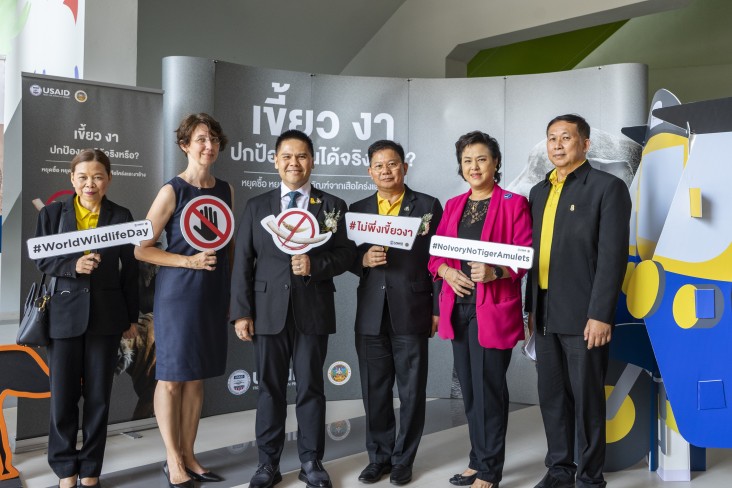Press Release Shim
Speeches Shim

For Immediate Release
Bangkok, Thailand -- In observance of World Wildlife Day, the United States Agency for International Development (USAID) and Thailand’s Department of National Parks, Wildlife and Plant Conservation (DNP) launched the new “No Ivory No Tiger Amulets #ไม่พึ่งเขี้ยวงา” campaign. The campaign is part of joint USAID-DNP efforts to reduce the use of wildlife products such as amulets made from endangered elephants and tigers. The new “No Ivory No Tiger Amulets” video features the well-known Buddhist Dharma Teacher Venerable Maha Sompong Talaputto calling on the public to question their beliefs in the protective power of ivory and tiger amulets.
“How can amulets made from elephant ivory and tiger fangs protect you, when these animals cannot even protect their own lives?” asks the Venerable Maha Sompong Talaputto in the campaign video. He adds: “You are free to believe, but your beliefs should not threaten other lives.”
The “No Ivory No Tiger Amulets” initiative is part of the ‘A Good Life is Free of Killing’ campaign. The campaign urges the public to stop using and buying amulets made from endangered animals’ body parts.
The campaign will be featured on Facebook and Pantip, Thailand’s popular discussion forum, reaching those who use or intend to use ivory and tiger products. To enhance community awareness, billboards and public service announcements displayed on tuk-tuks will be visible within locations frequented by amulet buyers and traders. Ultimately, the campaign will increase public awareness and promote social norms that reject the use of amulets made from ivory and tiger parts in Thailand.
World Wildlife Day is an event celebrated annually to raise awareness of the world’s wild fauna and flora. It recognizes the important role of the Convention on International Trade in Endangered Species of Wild Fauna and Flora (CITES), an international agreement between governments, in ensuring that international trade in specimens of wild animals and plants does not threaten their survival. This year’s World Wildlife Day theme is "Sustaining all life on Earth," encompassing all wild animal and plant species as key components of the world's biodiversity.
As part of DNP’s efforts to mark this year’s World Wildlife Day, it is drawing attention to concerns related to the current COVID-19 (Coronavirus) outbreak. “The Coronavirus outbreak has thrust the wildlife trade into the international spotlight. There is evidence wild meat may pose health risks to human lives and it may be linked to the current COVID-19 outbreak. This should motivate us to take action, not only to protect humans but to conserve wildlife and end the unsustainable use of wildlife parts and products,” said DNP Director Somkiat Soontornpitakkool.
USAID Wildlife Asia’s 2018 study Research on Consumer Demand for Ivory and Tiger Products in Thailand revealed that among the adult urban Thai population, roughly 500,000 own ivory products and around 250,000 use tiger products. In addition, roughly 750,000 intend to buy and use these products in the future. Consumers are characterized as fairly affluent, educated, and having stable occupations. An estimated 2.5 million and around 1.8 million adult urban Thais find use of ivory and tiger products socially acceptable, respectively. According to the study, beliefs that elephants and tigers bring good fortune and ward off evil fuel the demand and social acceptance for these animal parts.

Comment
Make a general inquiry or suggest an improvement.